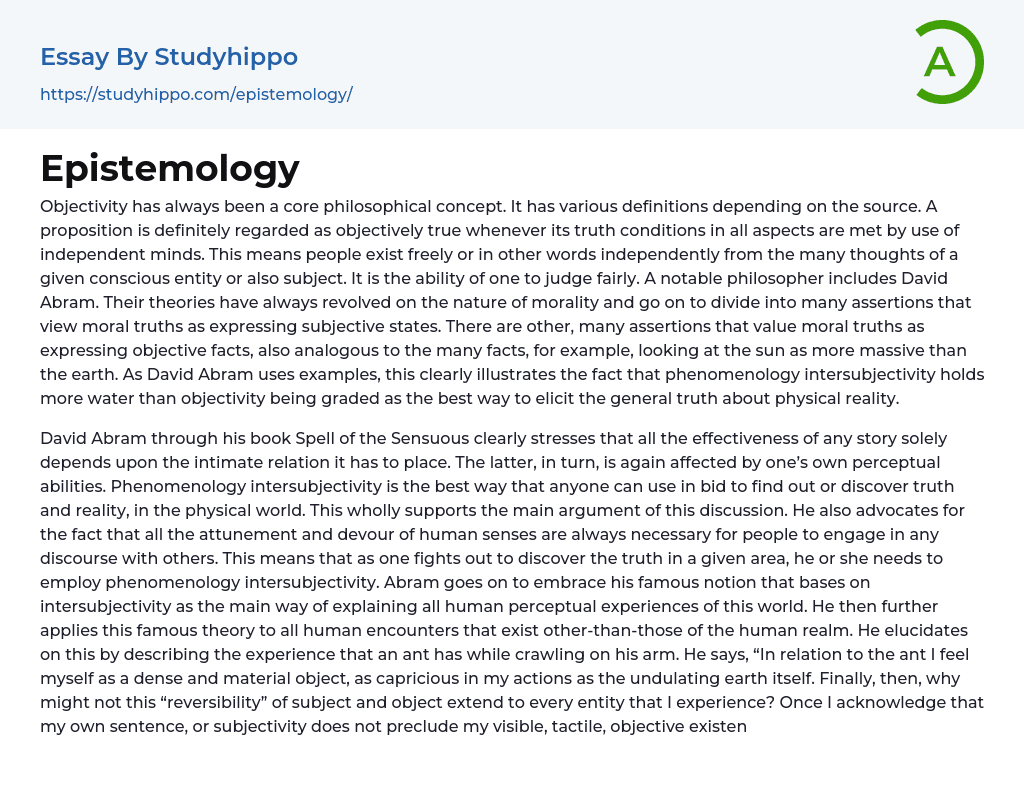Objectivity has always been a core philosophical concept. It has various definitions depending on the source. A proposition is definitely regarded as objectively true whenever its truth conditions in all aspects are met by use of independent minds. This means people exist freely or in other words independently from the many thoughts of a given conscious entity or also subject. It is the ability of one to judge fairly. A notable philosopher includes David Abram. Their theories have always revolved on the nature of morality and go on to divide into many assertions that view moral truths as expressing subjective states. There are other, many assertions that value moral truths as expressing objective facts, also analogous to the many facts, for example, looking at the sun as more massive than the earth. As David Abram uses examples,
...this clearly illustrates the fact that phenomenology intersubjectivity holds more water than objectivity being graded as the best way to elicit the general truth about physical reality.
David Abram through his book Spell of the Sensuous clearly stresses that all the effectiveness of any story solely depends upon the intimate relation it has to place. The latter, in turn, is again affected by one’s own perceptual abilities. Phenomenology intersubjectivity is the best way that anyone can use in bid to find out or discover truth and reality, in the physical world. This wholly supports the main argument of this discussion. He also advocates for the fact that all the attunement and devour of human senses are always necessary for people to engage in any discourse with others. This means that as one fights out to discover the trut
in a given area, he or she needs to employ phenomenology intersubjectivity. Abram goes on to embrace his famous notion that bases on intersubjectivity as the main way of explaining all human perceptual experiences of this world. He then further applies this famous theory to all human encounters that exist other-than-those of the human realm. He elucidates on this by describing the experience that an ant has while crawling on his arm. He says, “In relation to the ant I feel myself as a dense and material object, as capricious in my actions as the undulating earth itself. Finally, then, why might not this “reversibility” of subject and object extend to every entity that I experience? Once I acknowledge that my own sentence, or subjectivity does not preclude my visible, tactile, objective existence for others, I find myself forced to acknowledge that any visible, tangible form that meets my gaze may also be an experiencing subject, sensitive to the beings around it and to me (Abram, 67)”.
Descartes, on the other hand, by use of objectivity, does not clearly state how it is vital in determining truth. He consciously, was out to out rightly defend objectivity and also the “metaphysical” surety of all knowledge that is against classical skepticism. He claimed that all the ancient doubts that exist about mathematics and nature would be allayed had any of the ancients gone forward to undertake their course. This was in bid to recognize that God exists. He has flaws as he does not go on to explicitly identify any classical skepticism.
As David Abram has used the example of the ant, it brings out the fact
that phenomenology intersubjectivity, holds more water than objectivity being graded as the best way to elicit the general truth about physical reality. Phenomenology intersubjectivity should, therefore, be used as the main way to regard and determine truth.
- Improve essays
- Awareness essays
- Trust essays
- Farewell essays
- Visit essays
- Accident essays
- Driving essays
- Volunteering essays
- Excellence essays
- Knowledge essays
- Ignorance essays
- Growing Up essays
- Mistake essays
- Failure essays
- Peace Corps essays
- Expectations essays
- Luck essays
- Challenges essays
- Decision essays
- Sacrifices essays
- Struggle essays
- Vacation essays
- Memories essays
- Event essays
- Gift essays
- Party essays
- Incident essays
- Flight essays
- Obstacles essays
- Problems essays
- Success essays
- Personal Experience essays
- Overcoming Challenges essays
- Benefits of Volunteering essays
- Childhood Memories essays
- Car Accident essays
- Driver essays
- Driving under the Influence essays
- Volunteer Experience essays
- Nightclub essays
- Acceptance essays
- Age Of Enlightenment essays
- Child Observation essays
- Confucianism essays
- Conscience essays
- Critical Reflection essays
- Destiny essays
- Determinism essays
- Empiricism essays
- Environmentalism essays




